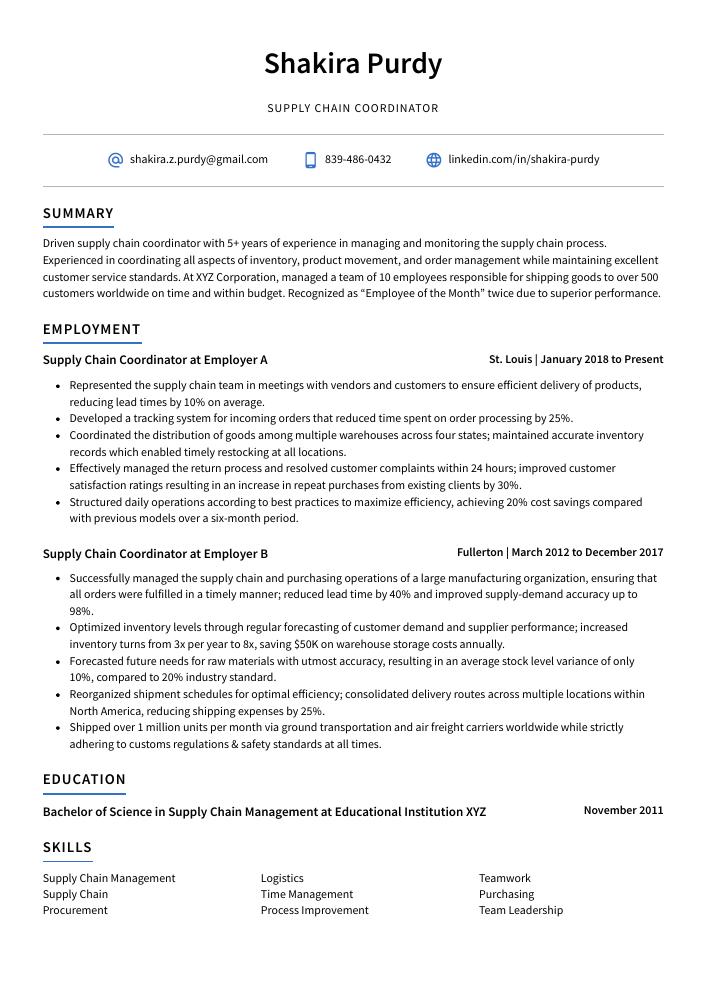Supply Chain Coordinator Resume Guide
Supply chain coordinators manage the flow of goods and services from suppliers to customers. They coordinate with vendors, negotiate contracts, monitor inventory levels, oversee storage and distribution operations, analyze data for trends in supply costs, and provide support for logistics teams.
Your organizational skills and knack for streamlining processes make you an ideal candidate for supply chain coordinator positions. To get employers to recognize your potential, you must write a resume that showcases your qualifications in the best light possible.
This guide will walk you through the entire process of creating a top-notch resume. We first show you a complete example and then break down what each resume section should look like.
Table of Contents
The guide is divided into sections for your convenience. You can read it from beginning to end or use the table of contents below to jump to a specific part.
Supply Chain Coordinator Resume Sample
Shakira Purdy
Supply Chain Coordinator
[email protected]
839-486-0432
linkedin.com/in/shakira-purdy
Summary
Driven supply chain coordinator with 5+ years of experience in managing and monitoring the supply chain process. Experienced in coordinating all aspects of inventory, product movement, and order management while maintaining excellent customer service standards. At XYZ Corporation, managed a team of 10 employees responsible for shipping goods to over 500 customers worldwide on time and within budget. Recognized as “Employee of the Month” twice due to superior performance.
Experience
Supply Chain Coordinator, Employer A
St. Louis, Jan 2018 – Present
- Represented the supply chain team in meetings with vendors and customers to ensure efficient delivery of products, reducing lead times by 10% on average.
- Developed a tracking system for incoming orders that reduced time spent on order processing by 25%.
- Coordinated the distribution of goods among multiple warehouses across four states; maintained accurate inventory records which enabled timely restocking at all locations.
- Effectively managed the return process and resolved customer complaints within 24 hours; improved customer satisfaction ratings resulting in an increase in repeat purchases from existing clients by 30%.
- Structured daily operations according to best practices to maximize efficiency, achieving 20% cost savings compared with previous models over a six-month period.
Supply Chain Coordinator, Employer B
Fullerton, Mar 2012 – Dec 2017
- Successfully managed the supply chain and purchasing operations of a large manufacturing organization, ensuring that all orders were fulfilled in a timely manner; reduced lead time by 40% and improved supply-demand accuracy up to 98%.
- Optimized inventory levels through regular forecasting of customer demand and supplier performance; increased inventory turns from 3x per year to 8x, saving $50K on warehouse storage costs annually.
- Forecasted future needs for raw materials with utmost accuracy, resulting in an average stock level variance of only 10%, compared to 20% industry standard.
- Reorganized shipment schedules for optimal efficiency; consolidated delivery routes across multiple locations within North America, reducing shipping expenses by 25%.
- Shipped over 1 million units per month via ground transportation and air freight carriers worldwide while strictly adhering to customs regulations & safety standards at all times.
Skills
- Supply Chain Management
- Logistics
- Teamwork
- Supply Chain
- Time Management
- Purchasing
- Procurement
- Process Improvement
- Team Leadership
Education
Bachelor of Science in Supply Chain Management
Educational Institution XYZ
Nov 2011
Certifications
Certified Supply Chain Professional (CSCP)
APICS
May 2017
1. Summary / Objective
A resume summary for a supply chain coordinator should highlight your experience in managing the entire life cycle of products and services. Include information such as how you have successfully managed inventory, negotiated contracts with vendors, and implemented cost-saving strategies to reduce operational costs. You can also mention any certifications or qualifications related to supply chain management that you may possess.
Below are some resume summary examples:
Dependable supply chain coordinator with 5+ years of experience in inventory management and logistics. Skilled in optimizing operations, improving efficiency, and developing cost-effective solutions to ensure on-time delivery of products. At XYZ Company, successfully managed a supply chain network that spanned 10 countries across 3 continents. Looking to join ABC team as a Supply Chain Coordinator and continue delivering exceptional results through innovative practices.
Energetic, results-driven supply chain coordinator with 5+ years of experience in global logistics, inventory management and procurement. Proven track record of streamlining operational processes by leveraging innovative technology solutions to reduce costs and improve customer satisfaction. Experienced in managing complex international shipments across multiple countries while ensuring compliance with customs regulations.
Accomplished supply chain coordinator with 7+ years of experience in the industry. Expertise lies in streamlining supply chain operations, reducing costs and developing strategies to increase efficiency. At XYZ Co., successfully managed delivery process for 3 different product lines while also managing supplier relationships, resulting in a 10% decrease in operational cost. Possesses an MBA degree from ABC University.
Talented supply chain coordinator with 5+ years of experience in material planning, inventory management, logistics optimization, and supply chain analytics. Highly skilled at developing strategies to reduce costs and increase efficiency. Achieved a 10% reduction in operational costs by streamlining the procurement process for ABC Corporation. Proven ability to build relationships with vendors and customers alike.
Passionate and organized supply chain coordinator with 5+ years of experience in logistics, inventory management, and customer relations. Seeking to use analytical skillset at ABC Company to increase efficiency across the entire supply chain process through data-driven decision making. At XYZ Co., successfully managed a team of 10 while overseeing $20M worth of inventory on a daily basis.
Reliable and organized supply chain coordinator with 6 years of experience in logistics and inventory management. At XYZ, led the implementation of a new system to track inventory levels which increased efficiency by 20%. Proven ability to handle multiple projects simultaneously while meeting all deadlines. Possess excellent communication skills as well as strong analytical abilities.
Detail-oriented supply chain coordinator with 5+ years of experience managing the daily operations and logistics of a busy international supply chain. Skilled at identifying cost savings, streamlining processes, and developing strategies to increase efficiency. At XYZ Corp., created an automated tracking system that saved 25% in labor costs while improving shipment accuracy by 32%.
Seasoned supply chain coordinator with 8+ years of experience managing the end-to-end supply chain process in a variety of industries. At XYZ, reduced costs by 10% and improved inventory accuracy by 7%. Now looking to join ABC to use my expertise in forecasting, procurement, and logistics operations for their global network.
2. Experience / Employment
In the experience section, you should list your employment history in reverse chronological order. This means that the most recent job is listed first.
When writing about what you did, keep to bullet points as much as possible; this makes it easier for the reader to digest and understand quickly. You want to include details on what tasks were accomplished and any results achieved from them.
For example, instead of saying “Managed inventory,” you could say, “Developed an efficient inventory management system which reduced stock-outs by 40% over a six-month period.”
To write effective bullet points, begin with a strong verb or adverb. Industry specific verbs to use are:
- Coordinated
- Monitored
- Scheduled
- Optimized
- Forecasted
- Analyzed
- Negotiated
- Streamlined
- Implemented
- Resolved
- Shipped
- Tracked
- Managed
- Reconciled
- Audited
Other general verbs you can use are:
- Achieved
- Advised
- Assessed
- Compiled
- Demonstrated
- Developed
- Expedited
- Facilitated
- Formulated
- Improved
- Introduced
- Mentored
- Participated
- Prepared
- Presented
- Reduced
- Reorganized
- Represented
- Revised
- Spearheaded
- Structured
- Utilized
Below are some example bullet points:
- Utilized industry-standard software to track and manage the supply chain process for a fleet of 12 vehicles, optimizing delivery cycles and increasing on-time performance by 10%.
- Negotiated contracts with over 20 vendors in order to secure supplies at discounted prices; saved an average of $3,000 per month from these negotiations.
- Compiled detailed reports on inventory levels, shipping costs & supplier performances for management review; used this data to identify areas that could be improved upon within the supply chain system.
- Managed communications between all stakeholders (including customers, suppliers & carriers) throughout the entire shipment cycle while ensuring that all shipments arrived safely and on schedule as promised.
- Proficiently handled returns processing tasks such as issuing credits/refunds when necessary or identifying opportunities for cost savings through better distribution practices.
- Resolved supply chain issues for over 300+ customers per day, resulting in a reduction of customer complaints by 35%.
- Monitored supply and demand trends to anticipate potential shortages & surpluses and adjusted purchasing plans accordingly; proactively increased inventory accuracy rate by 25%.
- Analyzed production data to identify cost savings opportunities while streamlining logistics processes, delivering $15K worth of yearly cost savings.
- Reliably ensured timely delivery of products with an average order turnaround time of 8 hours or less across all distribution channels; improved fulfillment speed by 20% compared to the previous year’s performance.
- Introduced new IT systems that automated tracking & reporting operations within the warehouse, increasing staff productivity levels by 10%.
- Implemented a new inventory control system that increased accuracy by 40% and reduced supply chain costs by $8,000 per month.
- Spearheaded a strategic distribution plan to ensure timely delivery of goods across 7 warehouses; achieved an on-time rate of 95%.
- Prepared daily/weekly reports for management outlining supplier performance metrics such as fill rates, order turnaround times and cost savings initiatives.
- Achieved annual goals set out in the operation budget including reducing transportation expenses by 25%, while boosting customer satisfaction scores to 92%.
- Confidently handled complex logistics issues with suppliers & customers alike, resolving disputes promptly & professionally within 24 hours or less on average.
- Demonstrated expertise in the supply chain process by leading 150+ transportation and distribution projects resulting in an improved operational efficiency of 20%.
- Mentored 3 new team members on inventory management, supplier procurement, warehouse operations, order fulfillment & customer service to ensure a consistently high level of services offered.
- Presented strategies for optimizing logistics processes at quarterly business meetings; implemented changes that decreased shipping costs by $4,000 annually.
- Revised company policies related to managing product warehouses and suppliers’ contracts based on industry trends and market analysis; enabled cost savings up to 25% over a two-year period.
- Accurately tracked shipments from origin to destination using various software systems including Enterprise Resource Planning (ERP); reduced delivery delays due to misplaced orders or incorrect addresses by 30%.
- Reduced time spent on supply chain operations by 30%, resulting in cost savings of $2,000 per month.
- Scheduled and coordinated deliveries for over 500 orders daily across multiple warehouses; ensured that each shipment was delivered safely on time and within budget.
- Resourcefully managed inventory levels to meet customer demand without exceeding warehouse capacity; minimized stock-outs while reducing expiration losses by 22%.
- Audited all incoming shipments from vendors against purchase order records to ensure accuracy of materials received and compliance with quality standards.
- Streamlined the manual process of tracking shipping status from suppliers, saving up to 4 hours a week in administrative tasks related to delivery timelines management.
- Expedited the fulfillment process of 10,000+ orders with a 98% accuracy rate and decreased inventory costs by $3,500.
- Improved the supply chain cycle-time by 20%, reducing operational expenses and enhancing customer satisfaction levels.
- Formulated cost-effective strategies for order processing, shipping and logistics management; achieved 100% on-time delivery each month without fail over two years’ period.
- Tracked global movements of supplies from origin to destination using modern software tools such as ERP systems; identified areas requiring improvement in shipment tracking & freight forwarding processes across all distribution centers globally.
- Efficiently managed product returns due to quality or damage issues within 24 hours; reduced overall returns rate from 8% to 4%.
- Reconciled inventory discrepancies by checking purchase orders, shipments and sales records; reduced inventory shrinkage by 23%.
- Assessed supplier performance based on delivery accuracy, cost effectiveness and overall quality standards; identified 20+ suppliers for alternative sourcing opportunities.
- Advised management on logistics operations to ensure optimal supply chain efficiency; saved an average of $4,500 in shipping costs each month through effective route optimization initiatives.
- Participated in the development of strategies for optimizing distribution channels & warehouse resources to reduce lead times from 3 days to 1 day without any additional overhead expenses incurred.
- Actively monitored freight movements with multiple vendors via online tracking systems to ensure timely deliveries were made and customer satisfaction was maintained at all times (+100% success rate).
3. Skills
Skill requirements will differ from employer to employer – this can easily be determined via the job advert. Organization ABC may require the candidate to have knowledge of SAP, while Organization XYZ may be looking for someone with experience in Oracle.
It is essential to tailor the skills section of your resume accordingly because many employers use applicant tracking systems these days, which are computer programs that scan resumes for certain keywords before passing them on to a human. As such, you want to make sure that all relevant qualifications and experiences are included here so they can easily be spotted by the system.
Once listed here, you should further elaborate on those skillset in other areas of your resume; this could include discussing it in more detail within the summary or experience sections.
Below is a list of common skills & terms:
- Account Management
- Communication
- Continuous Improvement
- Contract Negotiation
- Cross Functional Team Leadership
- Customer Satisfaction
- Data Analysis
- Data Entry
- English
- Forecasting
- Inventory Control
- Lean Manufacturing
- Logistics
- Logistics Management
- Manufacturing
- Materials Management
- Operations Management
- Problem Solving
- Process Improvement
- Procurement
- Product Development
- Project Planning
- Purchasing
- SAP
- Six Sigma
- Supply Chain
- Supply Chain Management
- Team Leadership
- Teamwork
- Time Management
- Warehousing
4. Education
Including an education section on your resume will depend on how far along you are in your career. If you just graduated and have no work experience, it would be wise to mention the relevant courses or training programs that prepared you for the supply chain coordinator job. However, if you have significant work experience, an education section might not be necessary.
If an education section is included, try to list any courses related to supply chain management or logistics that could help demonstrate your qualifications for this role.
Bachelor of Science in Supply Chain Management
Educational Institution XYZ
Nov 2011
5. Certifications
Certifications are a great way to demonstrate your expertise in a certain field and show potential employers that you are capable of performing the job. It is important to include any certifications related to the position on your resume, as this will give hiring managers an indication of how knowledgeable you are about the industry.
Including relevant certifications can help set you apart from other applicants and provide evidence that you have taken steps towards professional development in order to stay up-to-date with current trends.
Certified Supply Chain Professional (CSCP)
APICS
May 2017
6. Contact Info
Your name should be the first thing a reader sees when viewing your resume, so ensure its positioning is prominent. Your phone number should be written in the most commonly used format in your country/city/state, and your email address should be professional.
You can also choose to include a link to your LinkedIn profile, personal website, or other online platforms relevant to your industry.
Finally, name your resume file appropriately to help hiring managers; for Shakira Purdy, this would be Shakira-Purdy-resume.pdf or Shakira-Purdy-resume.docx.
7. Cover Letter
Writing a cover letter is a great way to provide additional information about yourself and your qualifications that may not be included in the resume. It is usually made up of 2 to 4 paragraphs and can help you stand out from other applicants for the same role.
Cover letters typically include an introduction, a body section which outlines why you’re well suited for the job, as well as any relevant skills or experiences you have that would make you an ideal candidate. They also allow recruiters to gain insights into who you are on a personal level – something that’s hard to achieve through just looking at your resume alone.
Below is an example cover letter:
Dear Lizzie,
I am writing in response to your job posting for a Supply Chain Coordinator. As an experienced supply chain professional with more than 10 years of experience coordinating the flow of goods and materials, I am confident I can make a positive impact on your organization.
In my current role as Supply Chain Manager at [company name], I oversee all aspects of the supply chain process, from procurement and sourcing to logistics and distribution. I have a proven track record of streamlining processes and improving efficiencies, which has resulted in significant cost savings for the company. In addition, I have developed strong relationships with suppliers and vendors that have helped us secure better terms and discounts.
I am knowledgeable about various software applications used in supply chain management, including enterprise resource planning (ERP) systems such as SAP. My analytical skills are also beneficial in identifying trends and areas for improvement within the supply chain.
I believe my skills and experience would be a valuable asset to your team. I look forward to discussing this opportunity further with you soon. Thank you for your time!
Sincerely,
Shakira
Supply Chain Coordinator Resume Templates
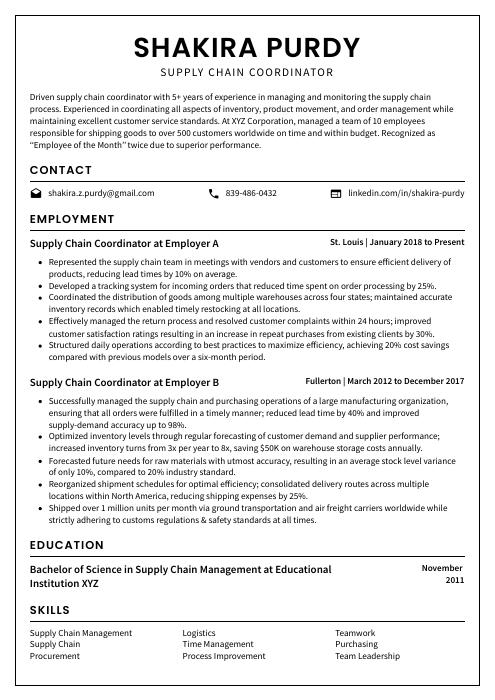 Cormorant
Cormorant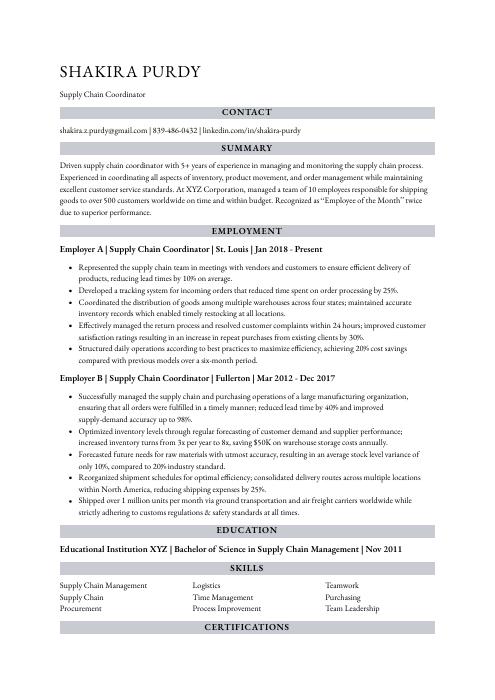 Numbat
Numbat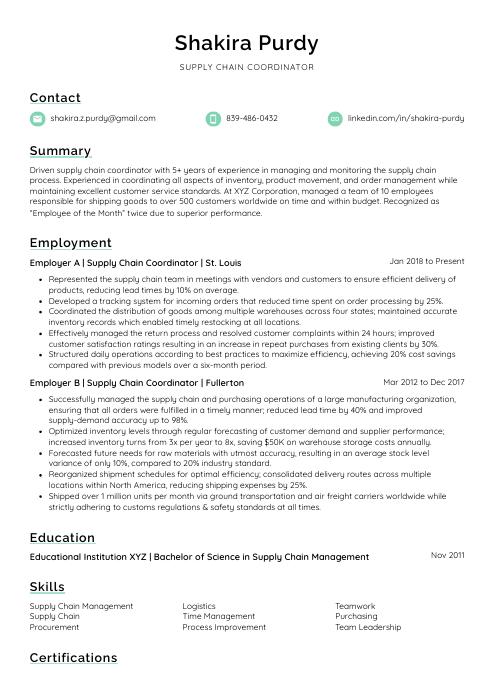 Lorikeet
Lorikeet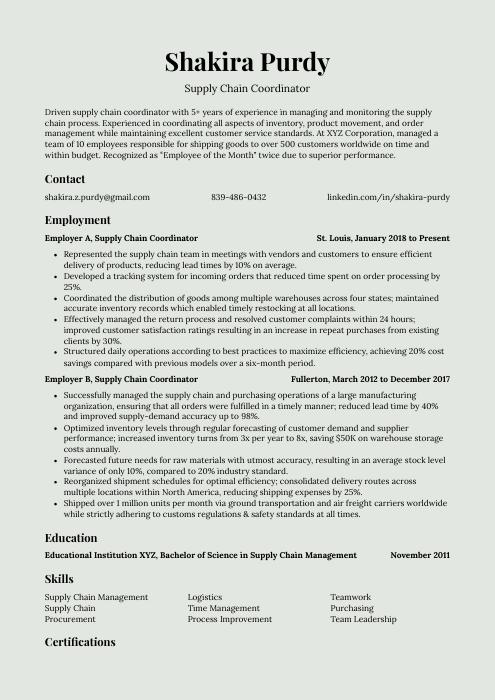 Saola
Saola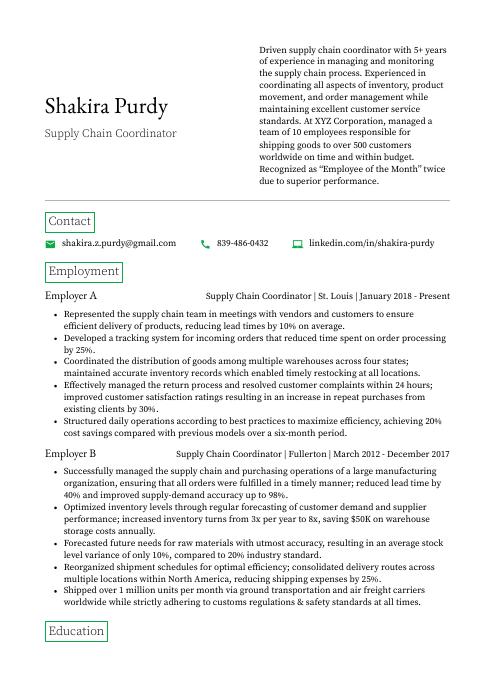 Quokka
Quokka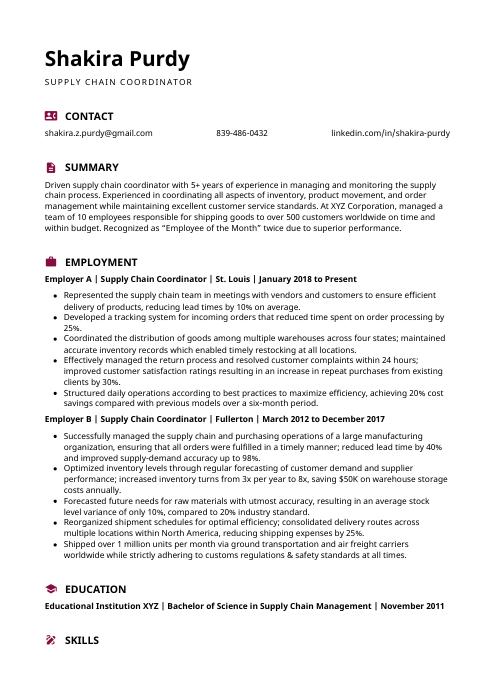 Hoopoe
Hoopoe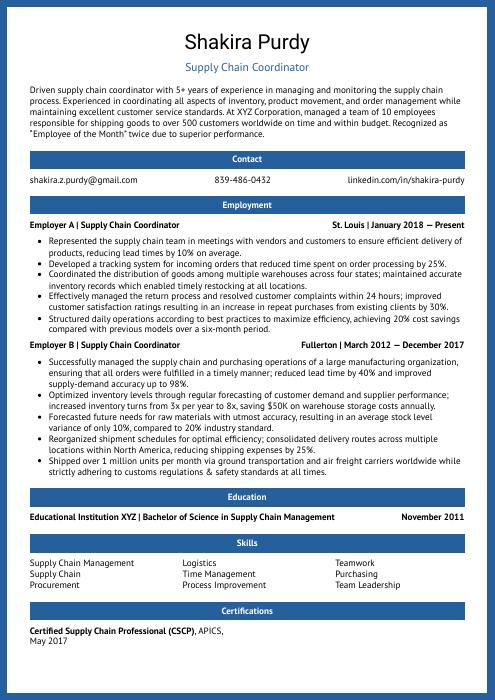 Ocelot
Ocelot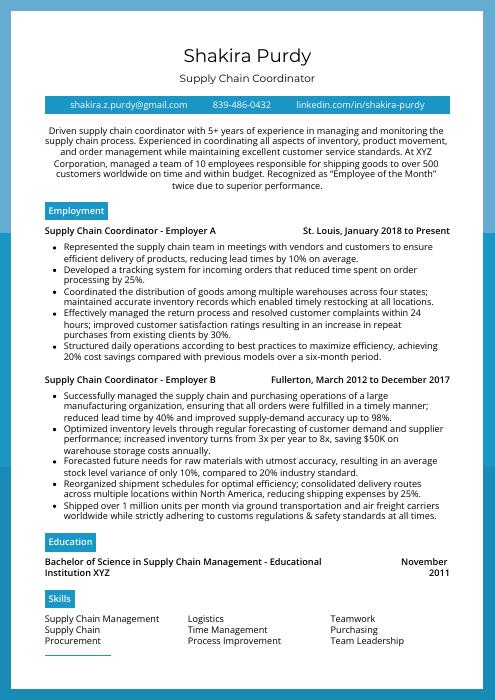 Rhea
Rhea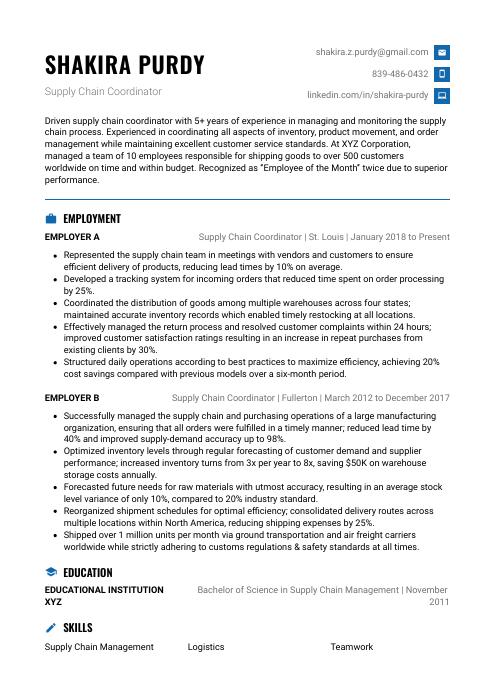 Echidna
Echidna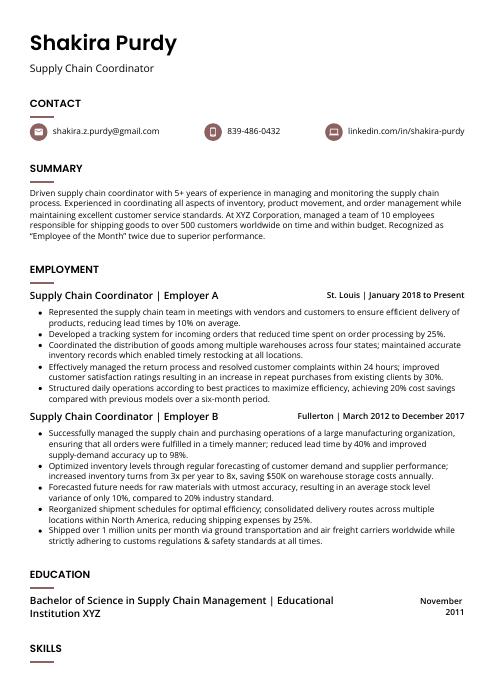 Fossa
Fossa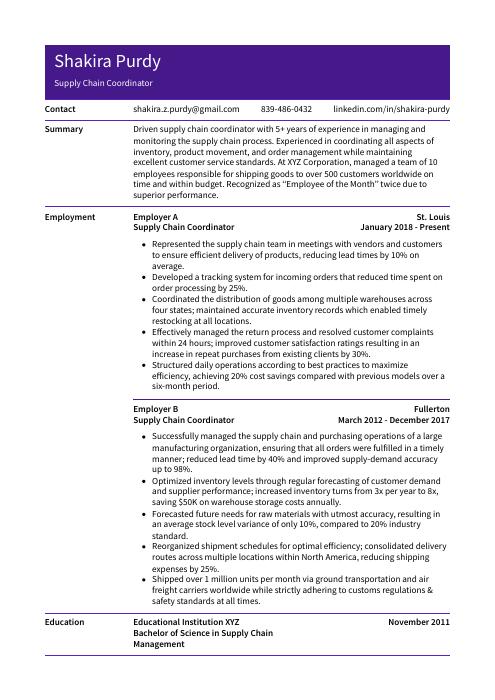 Pika
Pika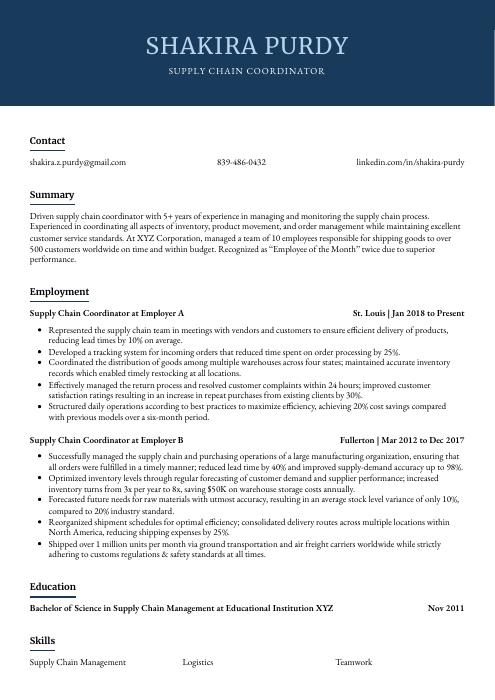 Bonobo
Bonobo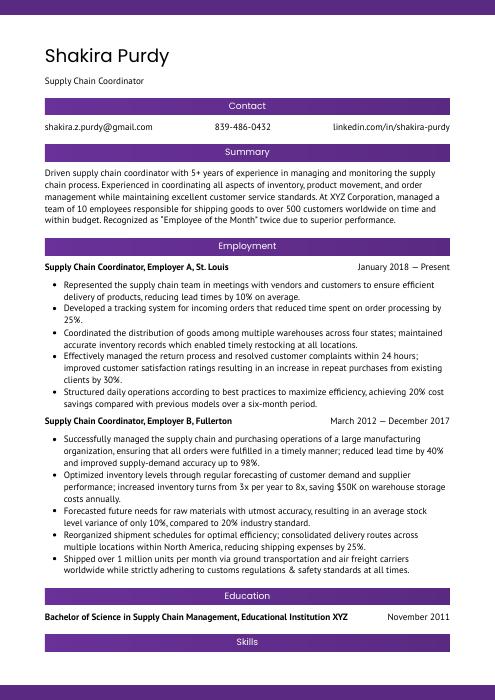 Jerboa
Jerboa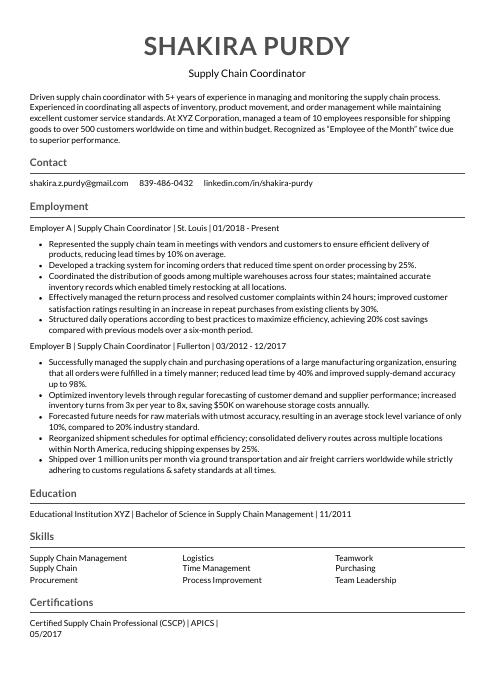 Indri
Indri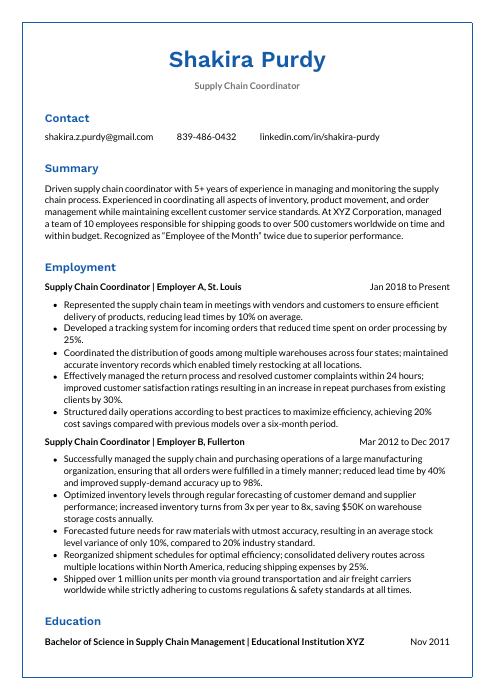 Markhor
Markhor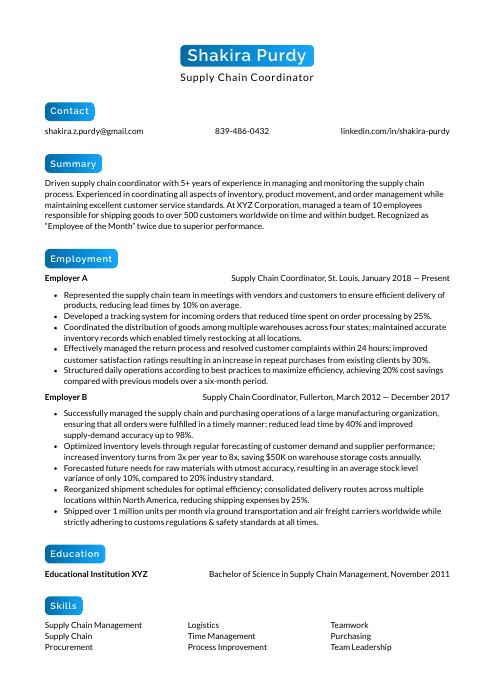 Kinkajou
Kinkajou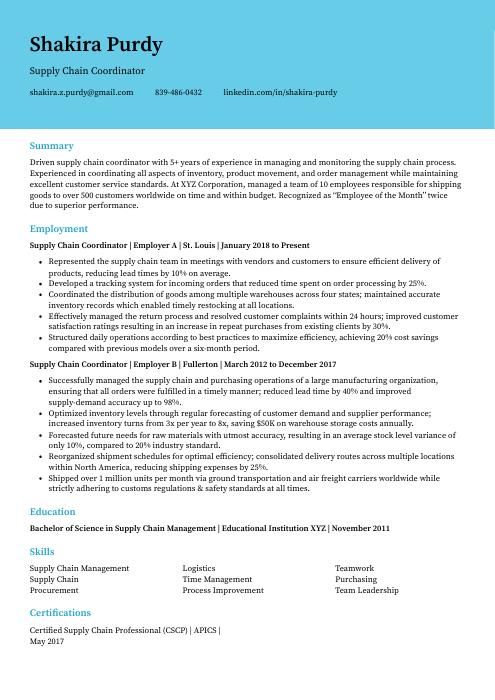 Dugong
Dugong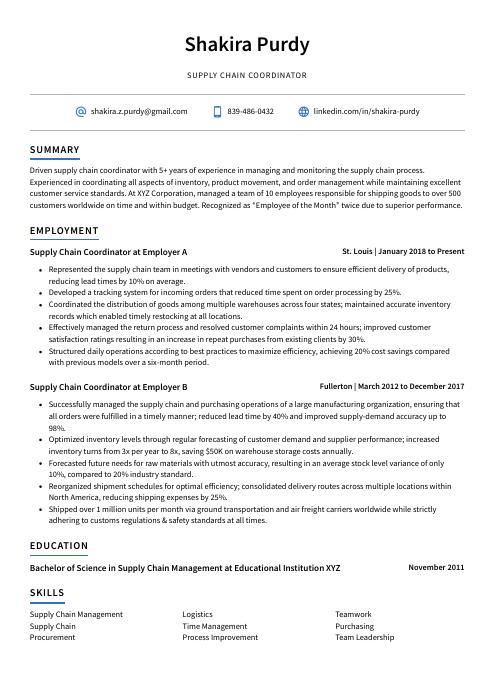 Axolotl
Axolotl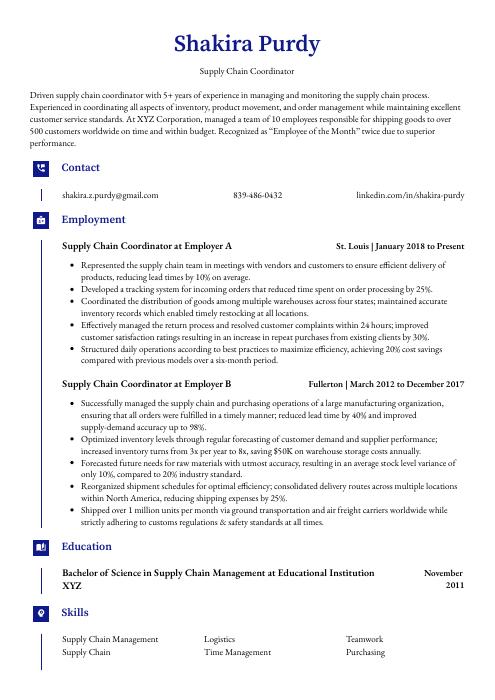 Gharial
Gharial Rezjumei
Rezjumei
